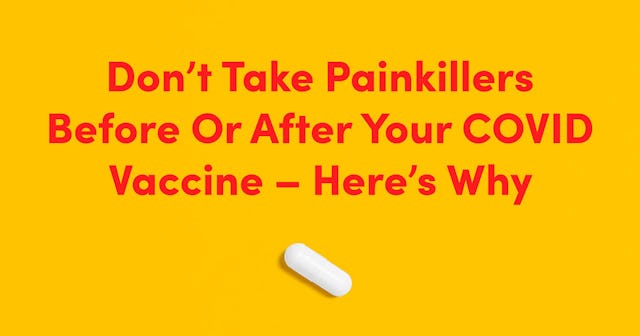Pre & Post COVID Vaccine: If You Can Avoid Painkillers, You Really Should

By now, most of us have heard that the COVID vaccines authorized in the United States from Pfizer and Moderna can come with a variety of mild side effects, lasting up to a few days, particularly after the second dose. Side effects are normal and often a sign that your body is building immunity.
Common side effects to the approved COVID-19 vaccines include sore arm, pain at the injection site, tiredness, headache, muscle aches, fever, chills, and tiredness.
Any one of those side effects alone might have you reaching for the painkiller in your medicine cabinet. But experts are warning against taking painkillers either before or after your COVID vaccine in most instances. “Don’t use them beforehand,” Michael Mina, MD, an assistant professor of epidemiology at Harvard T.H. Chan School of Public Health told a group of reporters in no uncertain terms last week. And even after your injection, “try very hard not to.”
Evidence on the effect of painkillers on the vaccine’s effectiveness is limited, but there is some data that suggests that “some painkillers might interfere with the very thing the vaccine is trying to do: generate a strong immune system response.”
A study on mice in the Journal of Virology found that certain painkillers that target inflammation, like ibuprofen, might lower production of antibodies. And antibodies, as a reminder, are what we need to fight off infection—so anything that lowers that number, even potentially, should be avoided when possible.
Research conducted at the University of Rochester Medical Center found that “Ibuprofen (Advil), aspirin and naproxen (Aleve) dampen the production of necessary antibodies that protect the body against illness.” Though the flu vaccine is not the same as the COVID vaccine, the possibility that painkillers have the same diluting effect on the COVID-19 vaccines does exist, according to experts. (And seriously, why take the chance?)
It’s important to remember, also, that though those side effects are uncomfortable, they are evidence that the vaccines are doing what they are supposed to do—teaching your cells how to fight off a true COVID infection. In a recent news briefing, Dr. Rochelle Walensky, director of the U.S. Centers for Disease Control and Prevention, said, “These symptoms mean your immune system is revving up and the vaccine is working.”
While it’s entirely counterintuitive to say feeling sick during a pandemic is comforting, in some ways feeling sick after receiving the vaccine is just that. Or if calling those uncomfortable side effects comforting feels like a stretch, then maybe a better word is worthwhile and potentially a critical indication that your immune system is generating a strong immune response–which is what you want. “This builds immunological memory,” says Mina. A fever actually encourages your body to produce antibodies “more efficiently,” notes Dr. Paul Offit, professor of pediatrics in the infectious diseases division at Children’s Hospital of Philadelphia.
There is one exception to the warning against painkillers before or after your vaccine, and that’s for folks who are already taking one of those medications for a health condition. In that situation, you should not stop taking the medication without first speaking to your doctor, says Jonathan Watanabe, a pharmacist at the University of California, Irvine.
Anna Shvets/Pexels
If the symptoms are particularly bothersome, there are some things you can do before turning to painkillers.
“Stay hydrated, lay down, don’t stress yourself out. I mean you can put down heating pads if you’re sore, if your muscles are sore, but I don’t think you need to take a medicine,” advises Dr. Offit.
If you’re experiencing pain at the injection site, the CDC recommends covering the site with a cool, wet cloth, and/or using the arm. To reduce any residual discomfort from fever, the CDC recommends dressing lightly and drinking lots of fluid. And of course, if the redness or tenderness increases after 24 hours or if the side effects don’t seem to be subsiding after a few days, you should contact your healthcare provider.
If you absolutely have to reach for a painkiller, remember also that not all painkillers are created equal, particularly when it comes to their potential effect on vaccines. Acetaminophen (Tylenol) is likely a better choice than ibuprofen because “it doesn’t alter your immune response,” notes Watanabe. It’s easier on the stomach than some other pain killers and targets pain signals in the nervous system, rather than the source of the pain.
Ibuprofen (Motrin, Advil, and other similar brands), on the other hand, target the site of the pain and can reduce inflammation. These are more likely to cause stomach irritation.
The vaccines are coming.
Slowly (more slowly than any of us would like) but surely, they are coming. Approximately ten percent of the country has received at least one dose of the vaccine and by all accounts those numbers will begin to grow.
Which means it’s prudent to begin thinking about what you should and shouldn’t do when it’s your turn and in the hours after.
Do continue to wear a mask and social distance, even after receiving your vaccine. Don’t take painkillers (except as advised, if you can help it. And do let yourself feel a little hope, because we could all use a little hope in this pandemic world.
Information about COVID-19 is rapidly changing, and Scary Mommy is committed to providing the most recent data in our coverage. With news being updated so frequently, some of the information in this story may have changed after publication. For this reason, we are encouraging readers to use online resources from local public health departments, the Centers for Disease Control, and the World Health Organization to remain as informed as possible.
This article was originally published on